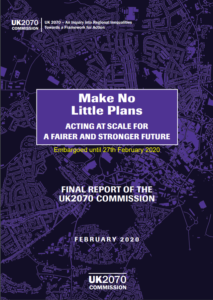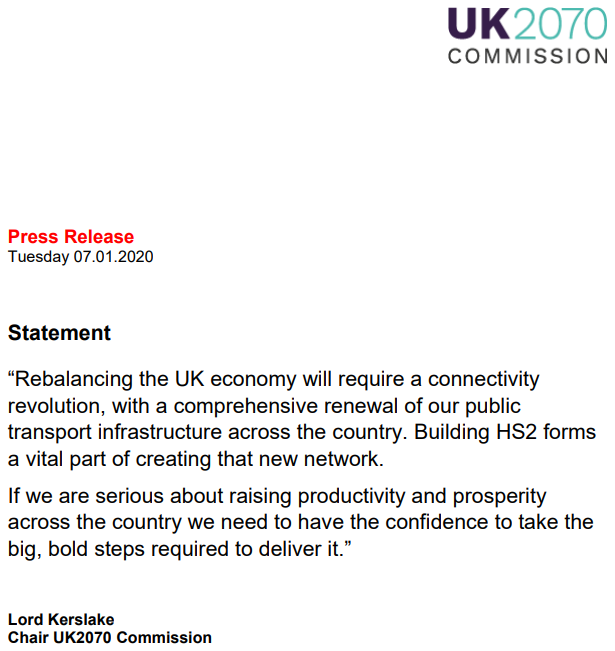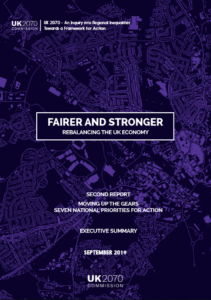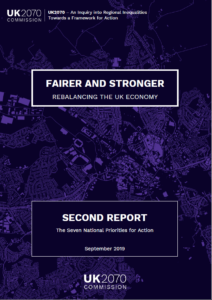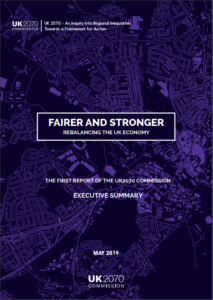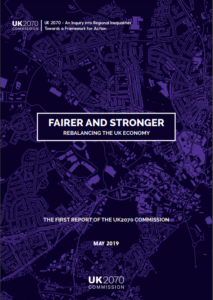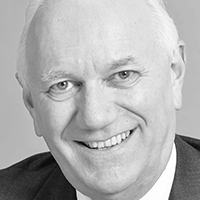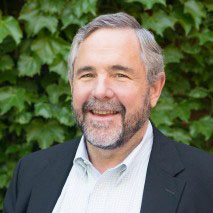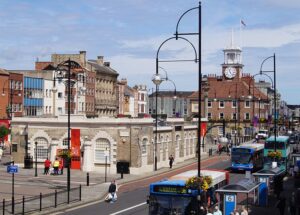MediaCityUK, Salford, 27 February 2020 – The UK2070 Commission issued both its Final Report Make No Little Plans – Acting At Scale For A Fairer And Stronger Future and an Executive Summary of this Report today, with chair Lord Kerslake, the former Head of the Home Civil Service, warning Government that it must “go big or go home” if it is to arrest further economic decline and social division.
Lord Kerslake said: “The Government’s desire to level up the UK economy is welcome. However, the scale of the challenge we face is such that we need a generational shift if we are to avoid serious decline and division. Many people in Britain feel left behind by growth elsewhere and that has contributed to an acrimonious debate about Europe. We now face a decade of potential disruption – leaving the European Union, confronting the impact of climate change and adjusting to the fourth industrial revolution.
“Our research shows clearly that these inequalities did not grow up overnight. They reflect an over-centralised system that fails to comprehend the reality of regional need and consistently comes up with policies that are either under-resourced, too fragmented, or too short-lived to make a difference. Some policy guidelines have actively stacked the odds against the regions. Time is not on our side and we cannot afford to keep on repeating those mistakes. Government must therefore think big, plan big and act at scale. Bluntly, if it can’t go big, it should go home.”
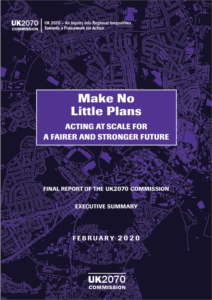 Click here to read the Executive Summary
Click here to read the Executive Summary
The UK2070 Commission calls on Government to stand alongsidehttps://uk2070.org.uk/wp-content/uploads/2022/06/UK2070-EXEC-SUMMARY-FINAL-REPORT-Copy.pdf business and community organisations and make a public pledge to tackle inequality through a 10-point programme contained with the Final Report. Amongst these are:
- Tripling the new Shared Prosperity Fund to £15bn per annum and continuing that commitment for 20 years – an extra expenditure of £200bn over that already planned.
- Investing in a new connectivity revolution, transforming the connections between cities, within cities and beyond cities to poorly connected towns. Infrastructure investment needs to increase to at least 3% of GDP per annum.
- Creating new ‘Networks of Excellence” in regional Research and Development to match the ‘Golden Triangle’ of London, Oxford and Cambridge.
- Shifting power and funding away from Westminster and Whitehall through a radical programme of devolution.
- Strengthening the local economies in disadvantaged towns.
- Tackling the historic underperformance of the UK on skills.
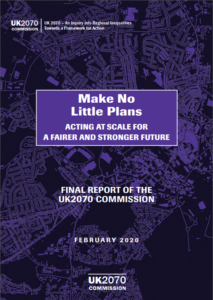 Click here to read the Final Report
Click here to read the Final Report
Lord Kerslake continued: “This is not a debate about North vs South or towns vs cities. If we continue on our current trajectory then the threats to regional livelihoods and the pressures on London and the South East will become so severe that everybody will lose out. We also need to recognise that the price of failing to reverse this decline will far outweigh the cost of investing now in creating greater opportunities. Properly investing in levelling-up will come at a cost – but so will doing nothing about it.”
The UK2070 Commission’s findings represent the culmination of 18 months of research and consultation carried out by six UK universities, supported by the Lincoln Institute of Land Policy, a specialist research organisation based in Cambridge, Massachusetts.
The Commission’s Final Report offers graphic insights into the impact of lost productivity – and points to the need for substantially increased long-term investment in infrastructure, skills, research and development and reviving local economies.
“The government’s recent decision to proceed in full with HS2 is correct because it represents coordinated investment at a scale that has the potential to benefit the whole economy,” said Lord Kerslake. “But that is only the start. The immensity of the challenge the UK faces means we need to see sustained interventions of a similar magnitude across the economy.”
Lord Kerslake concluded: “Over the past 18 months, the Commission has gathered disturbing evidence about the human impacts of inequality that no one should be comfortable with. Bluntly, it is also clear that trying to determine the future of regional Britain from Whitehall alone has not worked. It is therefore vital that the government recognises the reality of the challenge they face to truly level up the UK. We start from having huge inequalities now that are only growing wider.
“Unless the Government’s levelling up programme is comprehensive, coordinated and long term it is destined to go the way of the failed initiatives of previous administrations. This will result in even greater disillusionment. We can create a fairer and stronger future, but only if we act at scale.”

